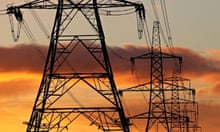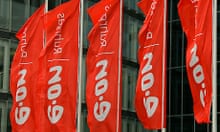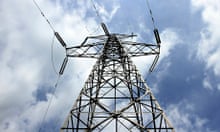Britain's largest domestic energy supplier, Centrica, has clashed with Ofgem over the regulator's claim that the industry was likely to double its profits over the next 12 months.
The owner of British Gas said its household supply arm had recorded a 26% slump in profits in the first half of 2014 and there was no chance of a turnaround over the next year.
"We have 25 independent analysts following the company, and if you look at their forecasts for 2015, there isn't a single one who is forecasting that profit margins will double or anything like that," said Centrica's financial director, Nick Luff.
Household bills at British Gas are predicted to be about £90 lower this year than in 2013, thanks to mild weather and a freeze on energy prices, said the company. It has lost 600,000 customers over the last year but still reported first half retail profits of £265m and Centrica group operating profits of just over £1bn.
Ofgem said this week that its latest monthly estimates showed overall industry profits are likely to rise to £106 per household over the next year, up from £53 over the previous 12 months. British gas serves 11m homes.
Luff, who will leave later this year as will Centrica chief executive Sam Laidlaw, said Ofgem had been wrong in the past and noted that Centrica's forecast was based on actual consumption whereas the Ofgem used a "theoretical model".
Jonathan Reynolds, Labour's shadow energy and climate change minister, disagreed. He said Ofgem's forecasts for the industry for the next 12 months was the latest example of an energy market that was not working. "Britain's hard-pressed bill payers have seen their energy bills rocket, despite falling wholesale costs. That is why Labour would freeze energy bills until 2017 so prices cannot rise, and create a tough new watchdog with the power to force energy companies to cut their prices when wholesale costs fall."
Richard Lloyd, executive director of consumer group Which?, said: "British Gas profits are down because of a warm winter, not lower prices. Energy companies must do everything they can to pass on any savings to their customers including falling wholesale and network costs."
The energy sector is the subject of a wide-ranging investigation into profiteering by the Competition and Markets Authority (CMA). Luff said Centrica has held meetings with the CMA and had its own small team working full-time on the inquiry but insisted the company was "not fearful" of the outcome of the investigation, which could lead to Britain's big six suppliers being broken up. SSE, ScottishPower, Centrica, RWE npower, E.ON and EDF Energy control about 96% of the market.
Luff noted that Centrica had put three gas-fired power stations up for sale two months ago and scrapped plans for an offshore windfarm, the Celtic Array off Anglesey.
He said he would be leaving without regrets that Centrica should have done things differently despite mounting criticism from fuel poverty campaigners in recent years. "We coped with quite dramatic changes in the shape of the energy market," he said.
Centrica's chairman, Rick Haythornthwaite, paid tribute to the "exceptional leadership" of Laidlaw, who will be replaced by BP executive Iain Conn.
Figures from French-owned EDF – another of the big six suppliers, serving 4m households – showed that operating profits in Britain rose 9.5% to £560m for the first half of the year. It said the growth was the result of higher output from its nuclear power stations, compared with a period last year when more of its generating capacity was out of service for planned maintenance. EDF said a decline in gas sales due to milder weather was partly offset by 3.2% growth in customer accounts.











Comments (…)
Sign in or create your Guardian account to join the discussion